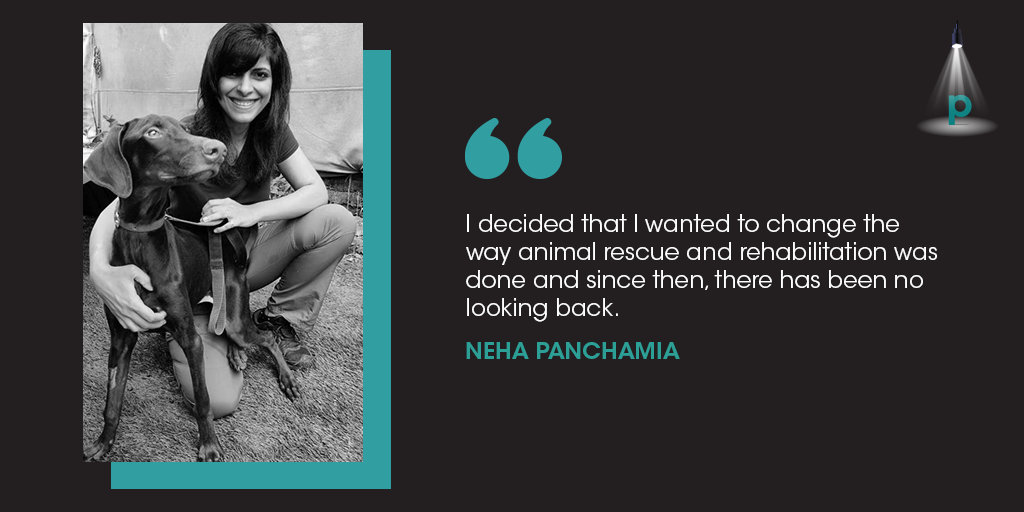Postcard Spotlight is an interview series showcasing young leaders and creative minds who are making their mark with their unique talent and drive.
In the Spotlight, this week is Neha Panchamia. She’s an animal rescuer and the founder and president of RESQ, an organisation aimed to minimise human-animal conflict and provide relief to animals in distress. Read more to know her journey.
Tell us about yourself – how did you get into wildlife rescue?
My love for wildlife began when I was in boarding school. It was located near Bhimashankar, Maharashtra. I often felt like an intruder, watching and observing them in their home for hours on end. Once I came back to the city, it became infuriating after a point to keep watching people rescue animals, keep them in their homes or dump them in zoos or rescue centres permanently. I remember thinking to myself that ‘There has to be a better way of doing this and ensuring that an animal is not rescued only to be subjected to further suffering!’
I moved to Pune in 2006. There was a phase where I would constantly end up witnessing scenarios where a lot of wildlife would end up being subjected to unnecessary handling, captivity and mismanagement, all in the name of ‘animal rescue or welfare.’ Pune District and the areas around it is home to a multitude of wildlife. The landscape that surrounds us and the amazing wildlife that thrives in it has greatly changed over the last decade. The growth in urban development, shifts in agricultural patterns and climatic changes have led to an increasing number of animals getting endangered, which started getting reported to our 24-hour animal emergency helpline at my organisation, RESQ. I decided that I wanted to change the way animal rescue and rehabilitation was done and since then, there has been no looking back.
What’s the story behind your initiative, RESQ?
“Are you just going to complain that nobody provides emergency rescue for animals in distress or are you going to just do it yourself?” That’s what I asked myself back in 2007, one month before I founded RESQ. That’s where it all began. Fast forward to today;
Species no bar. I run RESQ Charitable Trust (RESQ) as the Founder and President, which is a not-for-profit that works with all kinds of animals – domestic and wildlife. Powered by human connections, we tackle problems hands-on with a smile every day! Over the years, I’ve rescued and rehabilitated hundreds of animals myself but collectively, as an organization that thrives on teamwork, RESQ has changed the lives of over 1,00,000+ animals since inception through its ‘response’ and ‘prevention’ verticals which include:
– Distressed Animal RESQ Teams (DART)
– Wildlife Rescue and Treatment Transit Centre
– Companion Animal Veterinary Hospital, Rehabilitation Centre and Sanctuary
– Disaster Relief and Rescue for Animals
– Rabies Response and Testing Facility
– Human-Animal Conflict Mitigation, Education and Awareness
– Research and Training Programs
What are some of the biggest challenges you faced in your journey and how did you overcome them?
Our biggest challenge has always been finding a steady source of resources for our work. Especially in a country like ours, where there are so many social causes that are in dire need of attention and help, animal causes lie way below most people’s list. These challenges have often been overcome thanks to community support, but in recent times, we feel the need, even more, to stabilise this so that we can continue the work we do for animals, who are greatly dependent on the support we provide for them.
What advice would you give to someone who’s looking to adopt an animal?
I think it is extremely noble if one chooses to adopt an animal instead of purchasing one of pedigree from a breeder. However, there has to be a complete absence of bias when looking to adopt. You cannot justify adopting a Husky or a Pug because these are actually your favourite breed of dog and you’re just patting yourself on the back for saving yourself the trouble of paying a hefty amount to a breeder. Animals who have been re-homed from previous owners and are in need of a new loving home are looking exactly for that, love. You have to be patient, loving and firm because every animal that you choose to take home will also come along with its own endearing qualities but also some challenges. You need to ask yourself if you are at a time in your life and career where you can put aside enough time, energy and other resources to give your pet a fantastic quality of life; one that you would love to enjoy. Can you give your pet the best nutrition from the options out there? Will you commit to exercising them or spending time with them enriching their minds? Will you be able to afford veterinary bills if your pet falls sick? Will you be patient enough to work through house training or any challenging traits or temperaments?
Bringing pets home is a lifelong commitment and not a decision to be made lightly.
How does Social Media help you in building awareness around wildlife protection?
Social media has a large role to play when it comes to creating awareness. Documenting the various rescues that the team does shine a light on the various ways in which wild animals can be injured or trapped because of human activities. For example, nestlings and fledglings who become homeless and orphaned due to tree felling or marine animals which get trapped in fishing nets and hooks.
It is also a great tool to bring attention to vulnerable animal species and the risks they face due to industrialisation, urbanisation or changes in land-use patterns. When more people recognize how threatened or vulnerable certain kinds of animals are; that’s when moves can be made in the right direction to bring about their conservation. Social media can impact change in small yet significant ways, too. Even if a single person understands the right way to respond to coming across a snake and does not kill a snake fuelled by a knee-jerk fear or panic-based reaction; that’s one life saved.
How can people volunteer to help rescue animals?
If you have the time to dedicate to rescuing animals, you can do so on your own or alongside a network of like-minded people. It is not difficult to find and join forums like these online. No two rescuers are expected to be exactly as committed. If you cannot open your house to foster animals and can only offer to transport a sick or injured street animal to a veterinary clinic or shelter, that’s fine too. Often while rescuing an animal, stress and poor handling of the animal during rescue is what leads to more damage. So rescuing an animal safely using the right technique and equipment is just the first step. Thereafter, ensuring a swift release or minimum stress during transportation to a rehabilitation centre is the next. Go about rescuing animals responsibly. Do not trespass into private property. Always be up to date on your inoculations, especially vaccines against rabies and tetanus. Take care of yourself first. Never extend beyond your means. Temper your compassion with rational logic.
Tell us something about your ‘wildest’ rescue story.
It is literally impossible for me to pinpoint one as the wildest! The funny thing is that even the wildest and most improbable stories wind up comprising just a regular day at RESQ.
If your life were a book or movie, what would it be called?
Life the way I love it!
Which are your favourite accounts to follow on Social Media accounts and why?
Dr. Joel Alves @the_conservation_vet and Dr. Heinrich Vollgraaf because the work they do for wildlife is incredible! I also love following Justin Mott @askmott because I think the images he captures of animals are simply powerful!
Where can people get in touch with you?
Email [email protected]
Twitter @nehapanchamia
Instagram @nehapanchamia
LinkedIn – Neha Panchamia

